University of California Press, one of the most distinguished university presses in the United States, enriches lives around the world by advancing scholarship in the humanities, social sciences, and natural sciences. Its activities are supported by the UC Press Foundation and by philanthropic contributions from individuals and institutions. For more information, visit www.ucpress.edu.
University of California Press, Ltd.
London, England
Nestle, Marion.
Why calories count : from science to politics / Marion Nestle and Malden Nesheim.
p. ; cm. (California studies in food and culture ; 33)
Includes bibliographical references and index.
ISBN 978-0-520-26288-1 (hardback : alk. paper)
I. Nesheim, Malden C. II. Series: California studies in food and culture ; 33.
[DNLM: 1. Energy Intakephysiology. 2. Diet. 3. Food Industry. 4. Marketing. 5. Obesityprevention & control. 6. Politics. QT 235]
613.23dc23 2011044785
In keeping with a commitment to support environmentally responsible and sustainable printing practices, UC Press has printed this book on Rolland Enviro100, a 100% post-consumer fiber paper that is FSC certified, deinked, processed chlorine-free, and manufactured with renewable biogas energy. It is acid-free and EcoLogo certified.
The publisher gratefully acknowledges the generous support of the Barbara S. Isgur Public Affairs Endowment Fund of the University of California Press Foundation.
Introduction
When our then-editor at University of California Press, Stan Holwitz, suggested that we write a book about calories, we said yes right away. Consumption of too few or too many calories is an importantarguably the most importantcause of public health nutrition problems in the world today. Problems with calories affect billions of people in rich as well as poor countries. Consuming too few calories leads to malnutrition (undernutrition), which makes people more susceptible to infectious disease. The result is stunted growth, misery, and premature death in children and adults. More than a billion people, most of them in poor countries, go hungry for lack of food.
At the same time, just as many people in the world are consuming more calories than they need and becoming overweight and obese. The numbers of obese people are rising rapidly, even in the poorest countries. Obesity is now so common that the populations of some poor countries contain nearly equal numbers of people who are undernourished and overnourished. Obesity raises risks for any number of chronic diseases, most notably type 2 diabetes.
The health consequences of too many or too few calories threaten to overwhelm the resources of individuals, families, and health care systems. Countries can ill afford the costs of health care for obesity-related chronic or infectious diseases or to have large segments of their populations unable to work or function adequately. Some analysts even suggest that the health burdens of obesity alone may shorten overall life expectancy within the next few years.
Despite widespread concerns about the health and economic consequences of obesity on the one hand and undernutrition on the other, correcting calorie imbalances presents social and economic challenges that few countries are prepared to meet. Calories, therefore, affect societies in ways that are political as well as personal.
Calories, of course, derive from food. But calories are a convenient way to say a great deal about food, nutrition, and health. For this reason, and because calories are so poorly understood, we thought it would be useful to research and write about calories in all of their dimensionspersonal, scientific, and political. And because we are both consummate foodies who derive enormous pleasure from eating, we liked the idea of using calories as a way to think about these aspects of food.
Let's be clear from the beginning: this is not a diet book with a breakthrough scheme for losing weight and keeping it off. Instead, we try to provide an appreciation for what you are up against if you want to control your body weight in today's toxic, obesity-promotingor as we like to call it, eat morefood marketing environment. We intend this book to give you the information you need to interpret food labels, diet claims, and your own reactions to this food environment. Knowledge, we argue, is not enough to counter the biological urge to eat or the subtleties of food marketing, but it is a powerful first step in developing weight-management strategies that work for your particular body, lifestyle, and food preferences.
We need to explain that both of us are or were professors in human nutrition departments, Marion Nestle at New York University and Malden Nesheim at Cornell. Our collaboration grew out of a previous project that culminated in a book about the pet food industry. In working on that project, we discovered that we enjoyed researching and writing together and shared similar views of the strengths and limitations of nutrition science and its implications for dietary advice. In this book, the word we refers to the two of us and to our joint opinion.
THE FOOD CONTEXT
In considering this project, we were acutely aware that calories do not exist in isolation. They come from food. And along with calories, foods supply nutrients (vitamins, minerals, amino acids, essential fats), of which forty or more are required for life. To meet your body's needs for calories and nutrients,you do best when you vary, balance, and moderate your food intake. Eating a variety of foods balances the nutrients, meaning that you get enough of the ones you need. Foods contain a great many nutrients but in different proportions. If one food is low in a particular nutrient, others will compensate. If you typically vary the foods you eat, you really don't have to worry about nutrients. This leaves moderation as the central nutritional concern. Hence: calories.
One caveat: varying food intake takes care of nutrient needs only when the foods are of good nutritional quality. Processing removes nutrients from foods and often adds calories. Here we must introduce some terms nutritionists use to describe the nutritional quality of foods:
 Nutrient density: The proportion of nutrients in a food relative to its calories. Fruits, vegetables, whole grains, nuts, lean meats, and low-fat dairy products are nutrient-rich for their calories. Because fruits and vegetables often contain a great deal of water, which has no calories, they have an especially high nutrient density.
Nutrient density: The proportion of nutrients in a food relative to its calories. Fruits, vegetables, whole grains, nuts, lean meats, and low-fat dairy products are nutrient-rich for their calories. Because fruits and vegetables often contain a great deal of water, which has no calories, they have an especially high nutrient density.
 Calorie density: The number of calories relative to the weight of a food. Fruits and vegetables provide few calories relative to their weight. Their calorie density is low.
Calorie density: The number of calories relative to the weight of a food. Fruits and vegetables provide few calories relative to their weight. Their calorie density is low.
 Empty calories: Calories accompanied by no or few nutrients. Sugar, alcohol, and highly processed junk foods are characterized by a low nutrient density as well as a high calorie density. Their calories are empty.
Empty calories: Calories accompanied by no or few nutrients. Sugar, alcohol, and highly processed junk foods are characterized by a low nutrient density as well as a high calorie density. Their calories are empty.
Real, whole, or relatively unprocessed foods tend to be high in nutrients for their calories and low in calories for their weight. Diets based on such foods usually are adequate in essential nutrients and promote health. Nevertheless, the vast majority of health problems that result from inadequate or excessive food intake depend more on calories than on nutrients. We realize that what follows may sound like heresy coming from a couple of nutritionists, but unless diets are severely limited in variety or based largely on empty-calorie foods, nutrient intake is likely to be adequate when calories are adequate. This is especially true in today's era of nutrient fortification and nutritional supplements.

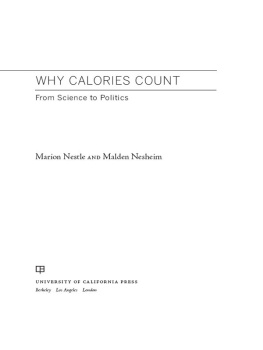

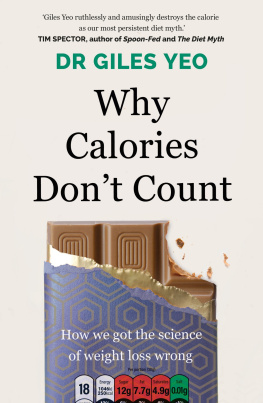
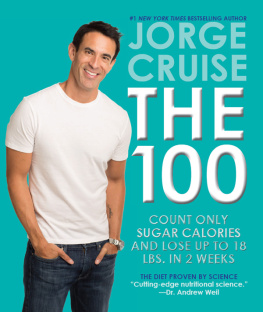
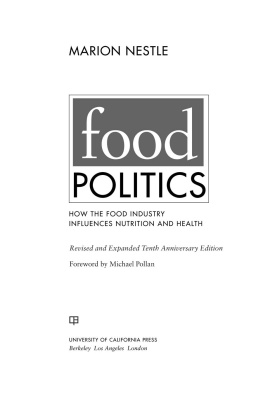
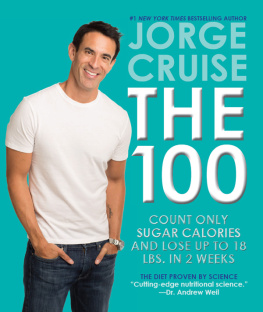
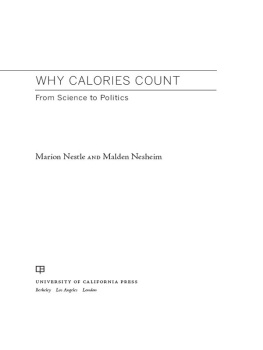

 Nutrient density: The proportion of nutrients in a food relative to its calories. Fruits, vegetables, whole grains, nuts, lean meats, and low-fat dairy products are nutrient-rich for their calories. Because fruits and vegetables often contain a great deal of water, which has no calories, they have an especially high nutrient density.
Nutrient density: The proportion of nutrients in a food relative to its calories. Fruits, vegetables, whole grains, nuts, lean meats, and low-fat dairy products are nutrient-rich for their calories. Because fruits and vegetables often contain a great deal of water, which has no calories, they have an especially high nutrient density.